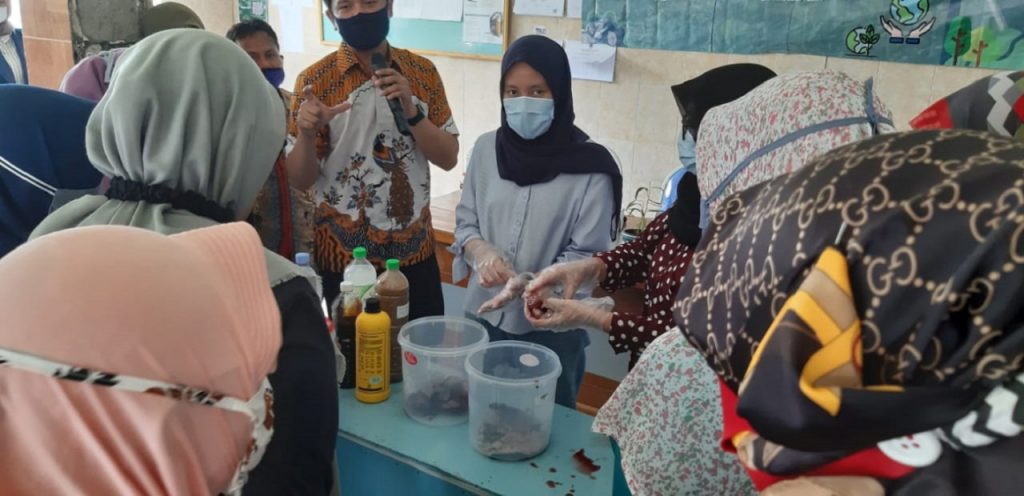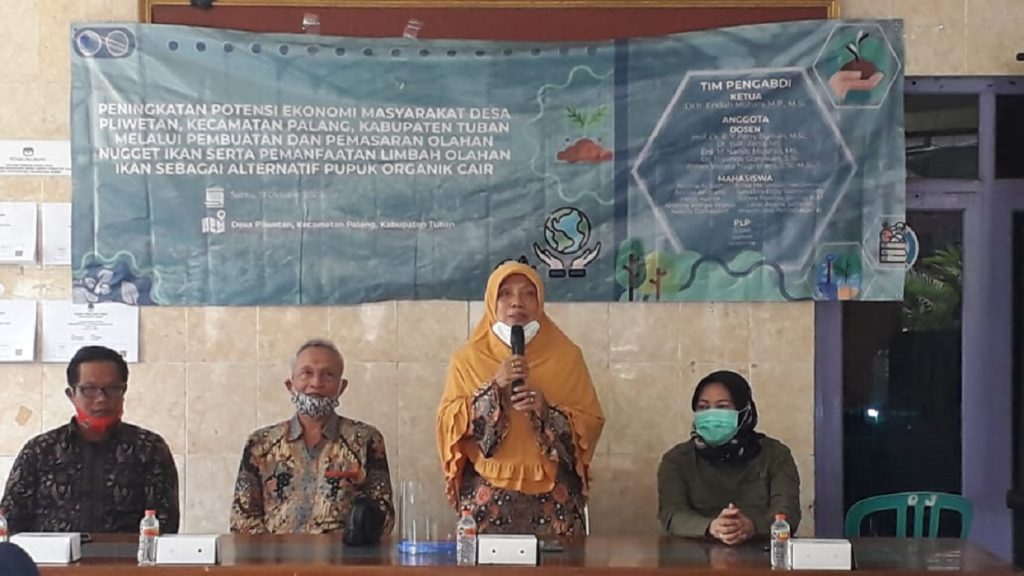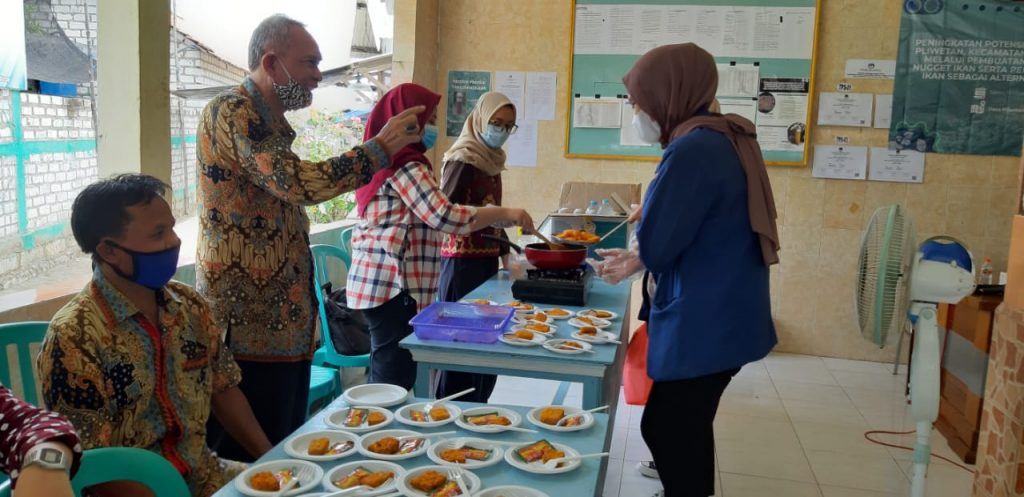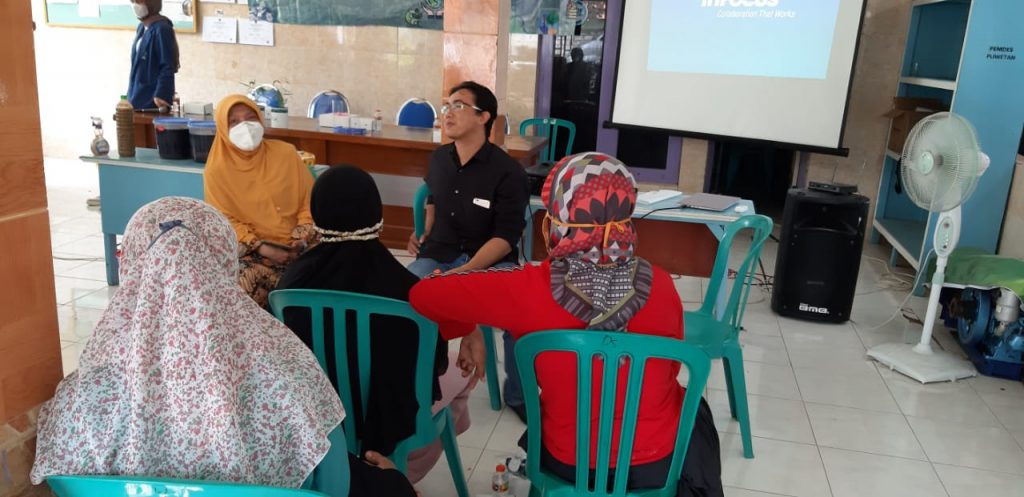ITS Develops Regional Potential Through Utilization of Processed Fish Waste

The demo of the making of liquid fertilizer from fish waste by the Abmas and KKN ITS team
ITS Campus, ITS News – The pandemic era is not an obstacle for Institut Teknologi Sepuluh Nopember (ITS) to continue contributing in overcoming problems in society. This time, ITS is developing regional potential through the use of processed fish waste as a program of Kuliah Kerja Nyata (KKN) and Abdi Masyarakat (Abmas) activities through the ITS Center for Pusat Studi Pengembangan Potensi Daerah dan Pemberdayaan Masyarakat (PDPM) or Regional Potential Development and Community Empowerment.
Dr. Ir Endah Mutiara Marhaeni Putri MP MSi as the head of the team composed of ITS lecturers and students said that this community service was carried out by training and research on fish nugget processing. As well as the conversion of processed fish waste into liquid organic fertilizer. “This is motivated by the problems and potentials that exist in Pliwetan Village, Palang District, Tuban Regency,” she explained.
Pliwetan Village is one of the areas with abundant natural resources in the fisheries sector, so most of the population works as fishermen. The processed pindang fish which is usually discarded and allowed to accumulate can have a negative impact on the environment. “Because there is still no further waste utilization process,” added Endah.
Though continued Endah, processed fish waste contains a lot of useful substances such as protein, fatty oil, and salt content. So it is necessary to have education about the potential of utilizing fish waste. Therefore, the ITS team answered these problems through this Abmas program

Dr. Ir Endah Mutiara Marhaeni Putri MP MSi (standing) while giving an explanation to the residents of Pliwetan Village
This Community Service (Abmas) Program begins with the manufacture of products in the form of fish nuggets and organic liquid fertilizer from processed fish waste. Furthermore, the resulting product is laboratory tested to determine the substances contained in the product. For fish nugget products with variations of mackerel and tuna fish, it has met the quality requirements of SNI 7758: 2013 without vibrio, filth, and sensory tests. Meanwhile, liquid fertilizer products have met the quality standard requirements for compost SNI 19-7030 2004.
Endah explained that the main target of the community at this year’s Abmas was housewives because they were expected to be able to produce fish nuggets. “As well as involving young people to participate in helping in processing fish processed waste into liquid fertilizer,” said the lecturer at the Department of Chemistry, Faculty of Science and Data Analytics, ITS.

Fish nuggets making training by the Abmas team and ITS KKN
Moreover, added Endah, the community was also given training on how to market their products. After training, the program continues with the installation of tools or products in the form of a waste treatment reactor. “The high enthusiasm of the community can be seen during the training and equipment installation activities together,” added Endah.
Endah said, with this Abmas program, the people of Pliwetan Village are expected to be able to process marine products with high economic value. And the community is able to market the products they produce. “This is to increase community economic activities,”she concluded. (naj/nadh/ITS Public Relations)

Discussing activities between the assisted residents and the ITS Abmas team
Related News
-
ITS Wins 2024 Project Implementation Award for Commitment to Gender Implementation
ITS Campus, ITS News —Not only technology-oriented, Institut Teknologi Sepuluh Nopember (ITS) also show its commitment to support gender
December 08, 2020 17:12 -
ITS Professor Researched the Role of Human Integration in Sustainable Architecture
ITS Campus, ITS News –The developing era has an impact on many aspects of life, including in the field
December 08, 2020 17:12 -
ITS Sends Off Group for Joint Homecoming to 64 Destination Areas
ITS Campus, ITS News — Approaching Eid al-Fitr, the Sepuluh Nopember Institute of Technology (ITS) is once again facilitating academics who want
December 08, 2020 17:12 -
ITS Expert: IHSG Decline Has Significant Impact on Indonesian Economy
ITS Campus, ITS News — The decline in the Composite Stock Price Index (IHSG) by five percent on March 18,
December 08, 2020 17:12
